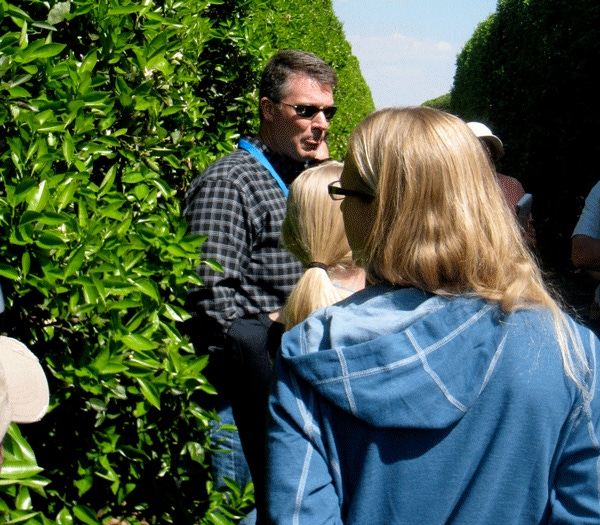March 24, 2011

To help federal officials understand the produce industries they regulate, University of Florida food safety experts recently took part in a cross-state tour that provided a behind-the-scenes look at growers’ operations and food safety efforts.
Five faculty members gave presentations highlighting their work to enhance the safety and quality of fruit and vegetable crops. The tour brought a delegation from the U.S. Food and Drug Administration and other agencies to 15 farms and packinghouses.
Organizers hope the tour leaves a lasting impression, one that may prompt attendees to see regulatory issues from a broader perspective, said Martha Roberts, special assistant to the dean for research with UF’s Institute of Food and Agricultural Sciences.
“It’s critical that the people regulating agricultural crops have the knowledge and experience of seeing how the crops are grown, harvested, packed, repacked, shipped and sold,” Roberts said.
And with the FDA scheduled to develop new federal produce safety regulations, the timing couldn’t be better, she said.
The tour was organized by UF and the Center for Produce Safety, a national, non-profit scientific group based at the University of California, Davis. The center funds several UF food safety studies; Roberts is a member of its executive committee. The tour was the second such event conducted for the FDA and the first representing East Coast agriculture. The first tour was sponsored by CPS and took place in California in late 2009.
Diversified crops
As the tour moved from Hillsborough County to Palm Beach County, participants saw citrus, blueberries, strawberries, tomatoes, radishes, lettuce and leafy greens, both in the fields and being harvested and packed. Business owners and operations managers explained their efforts to maintain high food safety standards.
UF personnel also made brief presentations. They outlined food-safety challenges affecting some of Florida’s major fruit and vegetable crops, described their work and answered questions from the agency delegates.
Keith Schneider, an associate professor in the food science and human nutrition department, discussed research aimed at keeping tomatoes safe from Salmonella bacteria, which can enter fruit through cuts or bruises.
Schneider also described his Extension efforts, training more than 1,000 tomato industry workers on state-mandated safety practices. He began that work in late 2008, shortly after the state enacted law establishing food safety best-management practices for tomatoes.
Microbiologist Michelle Danyluk, an assistant professor at UF’s Citrus Research and Education Center in Lake Alfred, described her research on fresh fruit, fruit juices and vegetables. She said she was pleased that the question and answer session covered more than just food safety, because many of the attendees had little previous exposure to growers’ day-to-day activities.
Other UF faculty presenters: Max Teplitski, an associate professor in the soil and water science department; citrus processing specialist Renee Goodrich-Schneider, an associate professor in the food science and human nutrition department; and horticultural scientist Tim Spann, an assistant professor at the Lake Alfred center, who discussed citrus issues such as greening disease.
Growers and industry spokespeople also discussed issues with the group.
Representatives of the U.S. Department of Agriculture, Florida Department of Agriculture and Consumer Services, state regulators and grower associations also attended.
For more information on the Center for Produce Safety, visit http://cps.ucdavis.edu.
You May Also Like




